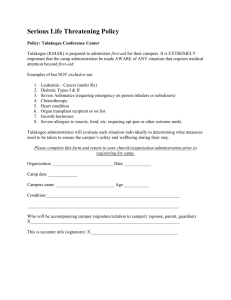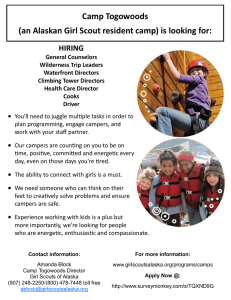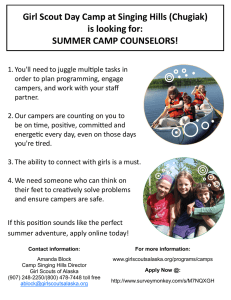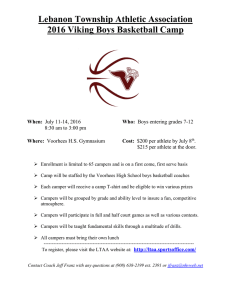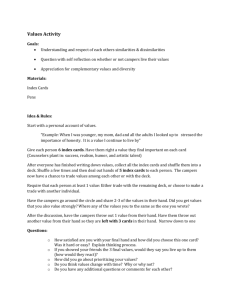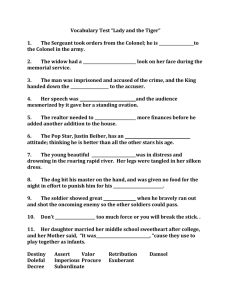Camper Discipline PDF - Stoney Lake Bible Camp
advertisement
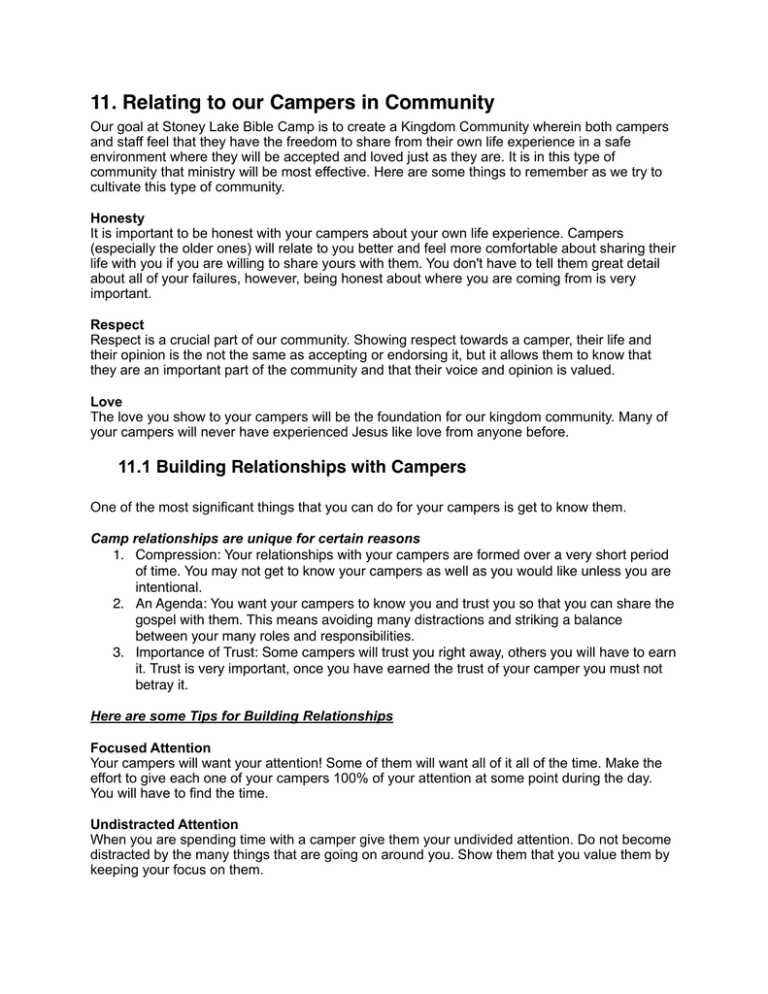
11. Relating to our Campers in Community Our goal at Stoney Lake Bible Camp is to create a Kingdom Community wherein both campers and staff feel that they have the freedom to share from their own life experience in a safe environment where they will be accepted and loved just as they are. It is in this type of community that ministry will be most effective. Here are some things to remember as we try to cultivate this type of community. Honesty It is important to be honest with your campers about your own life experience. Campers (especially the older ones) will relate to you better and feel more comfortable about sharing their life with you if you are willing to share yours with them. You don't have to tell them great detail about all of your failures, however, being honest about where you are coming from is very important. Respect Respect is a crucial part of our community. Showing respect towards a camper, their life and their opinion is the not the same as accepting or endorsing it, but it allows them to know that they are an important part of the community and that their voice and opinion is valued. Love The love you show to your campers will be the foundation for our kingdom community. Many of your campers will never have experienced Jesus like love from anyone before. 11.1 Building Relationships with Campers One of the most significant things that you can do for your campers is get to know them. Camp relationships are unique for certain reasons 1. Compression: Your relationships with your campers are formed over a very short period of time. You may not get to know your campers as well as you would like unless you are intentional. 2. An Agenda: You want your campers to know you and trust you so that you can share the gospel with them. This means avoiding many distractions and striking a balance between your many roles and responsibilities. 3. Importance of Trust: Some campers will trust you right away, others you will have to earn it. Trust is very important, once you have earned the trust of your camper you must not betray it. Here are some Tips for Building Relationships Focused Attention Your campers will want your attention! Some of them will want all of it all of the time. Make the effort to give each one of your campers 100% of your attention at some point during the day. You will have to find the time. Undistracted Attention When you are spending time with a camper give them your undivided attention. Do not become distracted by the many things that are going on around you. Show them that you value them by keeping your focus on them. Initiate Attentions Some campers will cling to you relentlessly. Other campers are very easy to love. You must take the time and make the effort to initiate attention with every one of your campers. Not just the ones you are naturally drawn to. Take a real and genuine interest in your campers. Add a Third Factor Sometimes one on one conversations can be awkward, it can make kids feel uncomfortable. They may avoid eye contact or avoid you all together. Add a third factor to ease the situation. This can be anything: junk food, tether ball, even just looking in the same direction instead of at one another. Remember their Names You should know the names of all of your campers within the first hour of the first day. Call your campers by name, this will help in the process. Transparency Your campers must be able to get to know you, the real you. To be a good role model to your campers you do not have to be perfect, but be real. Part of growing up is being able to laugh at yourself, your mistakes and your deficiencies. Tell your campers an embarrassing story or two, and remember to balance this transparency with a bit of intrigue or mystery. At the same time you do not need to reveal all of your deepest darkest secrets, or answer all of their curious questions – What if a camper asks you “do you make out with your boyfriend” or “have you ever been abused?” Sometimes there is a legitimacy to these types of questions, sometimes there is not. Don't be afraid to be goofy, or crazy. However, try to maintain a reasonable amount of dignity. You want your campers to have fun at your expense but also to respect you! Approachability Are you approachable? Are you happy and smiling? Or moody and sarcastic? Do people get the impression that you care about them? Do a self-assessment. Ask your friend. Approachability is very important. Common Ground To build your relationships with your campers you must find common ground. Don't act like a child, find interests or hobbies that you have in common. Camp is great place for sharing experiences with your campers. Draw from this to strengthen your relationships. Be a playing coach Don't expect your campers to do things you are not willing to do. Be the one to play the hardest, gets the dirtiest, is served last, and takes the things that no one else wants. Avoid Favoritism Some campers are cool, some campers are easy to love some campers are the worst. We cannot show favoritism, this is a serious offense. It will destroy your relationships with your campers. You must get to know each one of your campers, not just the ones that are easy to like, or the ones that you know already. Be Empathetic It is easy to become quickly annoyed by your campers. Before you get upset with them, before you blow up and do something you will regret later try to see behind his eyes. What is causing the behavior? Bad behavior may be a sign of some deep rooted issues. Give the camper some time, listen to him, it might make all the difference in the world. Constructive Language Watch carefully what comes out of your mouths. Even in fun, some kids cannot handle teasing or sarcasm. Maybe they get too much criticism at home. See that your speech builds up your camper, all of your hard work building relationships can easily be destroyed in a moment when you are not guarding your tongue. Care when Giving Advice To the camper you are an adult and he might not want advice from an adult. Give advice when you are asked, but remind the camper that it is only your opinion. Don't give bad or stupid advice even in jest. Some campers may not be able to get the fact that you are just kidding. Enthusiasm If something goes bad, or if your campers are not getting into an activity. Your enthusiasm can save the day. Kids need someone who is enthusiastic about being with them and about the activity that you are doing! Be spontaneous, look foolish, love everything, and get excited about their ideas and input. Persevere Don't give up or become discouraged when some of your campers do not respond to all of your hard work. Some will test the boundaries, or test you to see if you are genuine. Persevere, pray for patience. You may never see the fruit of your labor, but you will have more of an impact on many of your campers that you will ever know. Campers' Relationships with One Another Be a part of your cabin group early Cabin dynamics begin forming right away. It is crucial that you are there from the beginning and that you are making a spot for yourself within the group dynamic. If not, it will be harder to fit in later. Develop a sense of Belonging Your campers will want to belong to a group during camp. It is important, from that start, that everyone has a place in your cabin. Everyone must be accepted, and you need to make it clear that you will not tolerate anyone being excluded. Campers will have more confidence, to try new things, and ultimately more fun if they are an accepted member of your cabin group. Create Identity Do creative and special things with your cabin that no other cabin is doing. Dress up crazy, sing a crazy song, experiences that are unique to your group. Having a unique and separate identity draws the group together. Create the opportunity for campers to contribute Some campers will need extra help establishing their role in the group. Create an opportunity for them to establish their role. The Natural Leaders A natural leader will arise in your cabin and it may not be you. In fact, it may be the last camper that you want leading your cabin, and he may be a terrible influence on the rest of your campers! This can be a problem, but there are ways that you can deal with this situation. Do not make the natural leader your enemy, your whole cabin may turn against you. You may have to take some extra time, use some extra tough love, and build that relationship with that person. Do not allow him to intimidate or manipulate your other campers. Earn trust, and use his natural leadership to your advantage. Accountability Use positive group dynamics to maintain control of your cabin. Have your campers keep one another accountable, at cabin cleanup, at bed time etc... Kids can be cruel, you must see that their methods are fair and just, but let them work it out. Unite camper groups There will be cliques within your cabin. It is your job to unite your campers through shared experience. Teach Kids to Love One Another We have the responsibility to turn inward focus to outward focus. Teach kids selflessness, encouragement and compassion. Make them aware of their responsibility to their neighbors. Encourage them to forgive and restore broken relationships. If you have hurt their feelings make it right, right away. They will trust you more if you ask for forgiveness. Other ways to create community: - Let kids who carry great responsibility elsewhere be freed from that steady expectation. - Accept the camper. This is not the same as accepting their behavior! Still expect kids to be responsible for their own behavior. No pity but also no condemnation. - Enjoy the individuality of each camper. This can be tough as at risk kids can be difficult to like at times. - Be an effective listener. Listen with your heart and eyes. Hear the message behind the words. - Accept the camper at face value but don’t necessarily accept what they may say and do at face value. - Believe that the camping experience has something valuable for all campers and then seek to find what that may be for each one. - Seek ways to spend some time with each camper in your care individually each day. Kids want and need an adult to just listen, regardless of the topic or concern. - Create safe opportunities for risk-taking (new experiences). - Offer campers choices and give them time to make the decisions. - Recognize that conflict can be a great opportunity to teach and model conflict resolution. - Realize you are a role model for kids. Exercise care in the ways you respond and treat sometimes difficult campers. - Know your limits. Recognize when you’re in over your head. Situations may arise you need to refer to someone else. None of us can be all things to all kids. Work with your camp leadership. - Don’t make promises you can’t keep with kids. They’ve been let down enough. Only promise what you can deliver. This applies to disciple as well. - Remember you are an adult. They are still kids. They need you to be an adult who is consistent, reliable in what you say and do, provides structure, ensures their physical and psychological safety, and provides support and approval. - Let kids be kids. Be careful about expectations laid on them. They’ll mess up; work it through with them, failure isn’t fatal 11.2 Non-Verbal Communication Non-verbal cues make up a large part of interpersonal communication. Your non-verbal communication (body language etc.) will play a part in how the campers perceive you as their cabin leader as well as what you are saying to them. 1. Proximity Is about understanding how people use and perceive the space around them, to close and you will make a camper feel uncomfortable, too far and your message may be lost. 2. Kinesics Just a fancy way of saying body movement. It includes using your arms, hands, and torso, facial expressions, and body orientation. These movements can all affect how your message is heard and understood. It is hard to communicate enthusiasm or excitement if you physical cues indicate that you are bored or disinterested. Remember to smile! 3. Posture Posture and body position can be used to determine your degree of attention, involvement, and interest. It is also a pretty clear indication of caring, respect, and fondness. When communicating with a camper show them you are interested by your posture. 4. Gestures Gestures are non-verbal body movements that communicate a specific meaning. High fives, nodding, winking, thumbs-up, OK, and waving are all good examples. A positive gesture can communicate something to a camper quickly and at times more effectively than words. 5. Eye contact In most Western cultures, eye contact with another person shows respect, interest, and confidence. It shows you care enough to focus on the message you’re hearing or delivering. Eye contact also helps you know if a camper is paying attention to you. Reminder: First Nations campers will avoid eye contact with you for cultural reasons, remember not to force eye contact with them. 6. Physical contact A safe and reassuring touch, can send the message of caring and attention, add depth and clarity to your message, and help a lot of campers feel more comfortable with you. Examples of appropriate physical contact: Hand on shoulder, Hand on head, Hand on upper back, Arm around shoulder, one hand on each shoulder, standing face-to-face. 12. Effective Camper Discipline Discipline is a necessary part of your job as a Cabin Leader this summer as you will come upon situations where campers are acting in ways that are not conducive to a healthy camp environment. Often times when campers act out it is a combination of ignorance, immaturity and excitement not because they want to break rules just for the sake of breaking the rules. Discipline is a way of enforcing the boundaries both for the smooth operation of the camp as well as for the security of the individual of camper. When doing discipline it is important that the campers know you love them more then you love the rules. 12.1 Prevention When we think about camper discipline the first thing we need to think about is prevention. These six steps will help you prevent disciplinary problems. 1. Get to know your campers Campers are most likely to comply when they respect you. Respect, in turn, hinges on your campers’ feeling that you really care about them. Begin showing this care by learning their names, hometowns, likes, and dislikes as soon as they step through the door! 2. Lead close up Barking orders, commanding from the sidelines, and otherwise leading form a distance will separate you from your campers and make them less inclined to listen to you. You are in a position of authority, but you need not be authoritarian or bossy. Your campers will resent you if you abuse the power that your position affords. 3. Establish the rules on the first day To set a tone of respect, gather your campers within hours of their arrival and state clear expectations. It is important that your campers know the camp rules, you may also want to work together as a cabin to establish some of the cabin rules. It is also important that your campers are familiar with the camp schedule and how they fit into the schedule. 4. Put on the brakes Children are naturally curious and energetic, but their impulses and poor judgment can quickly transform enthusiasm into chaos...or worse. Just remember: You are the adult. It’s your job to put on the brakes and regain control when your campers start to lose control. Stopping an activity before it gets out of control is a great way to prevent problems. 5. Supervise actively When you are supervising campers it is important that you are involved in what is happening rather than sitting on the sidelines. Walk around, talk with campers, and see what everyone is up to. Actively supervising, rather than passively existing at camp will prevent misbehavior and camper-to-camper abuse. 6. Use effective praise It’s easy to notice bad behavior but “catching kids being good” is a skill you may need to cultivate. When children arrive at camp, they’ll be looking for boundaries. When children listen, follow directions, and behave unselfishly, you should offer praise that is positive (not sarcastic), immediate (not delayed for days), specific (not vague), and true (not exaggerated). Genuine praise, used strategically, helps reinforce and shape good behavior. 12.2 Four Leadership Styles High Support Low Control Permissive Cabin Leader Authoritative Cabin Leader Neglectful Cabin Leader Authoritarian Cabin Leader Low Support 1. The Permissive Cabin Leader: High Control Offers high support but low control. Campers love this cabin leader but the result can often be chaos as the boundaries are not being enforced. Campers who are naturally shy or withdrawn will not feel safe and free to have fun in this type of environment. 2. The Neglectful Cabin Leader: Offers low support and low control. It’s all bad here. 3. The Authoritarian Cabin Leader: Offers high control but low support. Leads from a position of authority which results in campers following the rules. However, this style of leadership neglects the most important part of our camp ministry which is the relationship with the camper. 4. The Authoritative Cabin Leader: Offers high support and high control. Effectively uses the preventative measures outlined above. The result is an environment where campers feel safe, can have fun and one where you can build successful relationships with them. 12.3 Confrontation and Clarification There will be times when, despite your best efforts, your campers will misbehave. If it is a case where one campers has broken the rules often times finding out what happened and deciding on the consequences is easy. When more than one camper is involved it is unlikely that we will ever find out what actually happened and determining the best course of action is a lot more difficult. If you need help ask for it! 1. Get control of the situation Stop the campers from any wrongdoing and remove them from any immediate danger. Remain present with these campers if possible. 2. Maintain your composure It is important for you to be in control at all times, regardless of the type of misbehavior or how it appears to you. Effectively dealing with the situation and working towards positive outcomes is only possible if you are calm and composed. Yelling at or intimidating your campers as well as any type of physical punishment is never appropriate. 3. Try to determine what actually happened Appearances are often deceiving, sometimes what you perceive to be bullying or a camper lashing out at another camper is a retaliation to something that has already happened to them. Avoid drawing any conclusions to quickly from what you believe you saw. Take the time to listen to both sides of the story before you decide on any consequences. 4. Take time to clarify Explain to everyone involved how their behavior was in breach of the rules that you had explained to them beforehand! 5. Decide on the consequence The consequence should be thoughtful and appropriate. Please see the examples below. 6. End on a positive note Let your campers know that you still love and support them, just not their actions. Once the situation has been resolved let them restart with a clean slate. Skillfully Determining the Consequences 1. Time Outs Asking campers to sit and think about how they’ve behaved is not just a technique to use with young children. If done well, time outs work with older children and teens, too. Of course, your tone with teens will be different, but the objective is the same: To reflect on how your behavior affects yourself and others. When giving a time out, keep your own voice calm and ask the camper to sit quietly for five minutes. At the end of five minutes, discuss the behavior that led to the time out, its effect (including on others), and the positive, alternate behavior. 2. Requests and Rationales Sometimes, children misbehave out of ignorance, not malice. Calmly stating your request, such as “Please hang up your life jacket” is even more effective when you tag on a rationale, such as “Then it will be dry for the next person” Giving campers the reason for rules provides an added incentive for them to comply next time. 3. State Desired Behavior and Consequences This technique combines a calm, clear statement of the positive alternate behavior (“Instead of hitting someone you’re angry with, use your words or come find a staff member.”) with a pending punishment (“If you hit someone again, you’ll be sent home.”) Avoid the common pitfalls of anger and hyperbole. Screaming at a child or threatening a consequence you would or could never enforce is folly. And remember, it is never OK to withhold food as a punishment; it is never OK to use physical discipline; and it is never OK to use profanity. 4. Logical Consequences Whenever possible, impose a consequence (disciplinary action) for a misbehavior that is logically connected to the misbehavior itself. If you can design something for campers that helps them make amends for what they’ve done, so much the better. For example, it’s logical to have a camper sand off the graffiti he wrote inside a camp building. 5. Natural Consequences When there are no safety or health concerns, it is sometimes appropriate to let natural consequences take their course. For example, if a camper forgets to hang up a wet bathing suit let it stay wet on the ground. Putting on a cold, wet bathing suit may help this camper remember to hang it up next time. 6. One on One Conversations Sitting and talking one on one with a misbehaving campers allows you both to share your perspectives and brainstorm about possible solutions. Stay calm, listen carefully, and make a specific plan. Finish by asking the camper, “What can I do to help you be successful with this plan?” Inappropriate Consequences There are many appropriate ways to disciple your campers, there are also ways that are never appropriate. For example: you are never allowed to: yell at a camper, hit a camper, physically or verbally intimidate a camper or withhold food from a camper. Other Appropriate Consequences: 1. Sitting out an activity: You may choose to remove a camper from an activity if they are continually misbehaving. You may also sit a camper out of an activity if you had already predetermined this as a consequence for certain behavior. For example: Sitting a camper out of a night game because they were not following your cabin lights out rules. 2. Exercise: Certain physical activities such as running, push-ups or burpees may be used for disciplinary purposes provided that they are not used excessively. 100 pushups for talking after lights out is not an appropriate consequence. 3. Extra Work Duty: You may assign additional work for your campers if they are misbehaving. If one of your campers knowingly skips out on after meal cleanup requiring them to make up for this at a later time is appropriate. If one of your campers does not clean their belonging during cabin clean up requiring them the next day to sweep as well as pick garbage around the outside of your cabin would be appropriate. Stoney will at times use other work duty as punishment but this must be cleared with a director. 4. Director Talk: Sometimes a talk with one of the directors is consequence enough for certain misbehaviour. If you find yourself dealing with a situation that is out of hand, or requires serious discipline please talk to one of the directors. Assigning any discipline beyond what has been talked about here is also the responsibility of one of the directors. 13. Children with Verbal Learning Deficits Your ability to communicate clearly to campers will be an important part of your ministry this summer. It is likely that you will encounter campers with preexisting conditions that make communication difficult for them. Campers with ADHD or ADD may have a hard time processing your communication to them. Social language difficulties are also common among children diagnosed with Autism, Asperger’s Syndrome or a Nonverbal Learning Disability. Common traits of communication deficits include difficulties such as: 1. not understanding the use of slang, metaphors and idioms 2. getting stressed with too much talking 3. benefiting from both verbal and visual cues Here are some important things to remember when communicating to all of your campers especially ones with any communication difficulties. 1. Mean what you say and say what you mean Use words that mean exactly what you’re trying to convey, avoid any slang or idioms that may be difficult to understand. 2. Use the camper’s name first and speak clearly and deliberately Keep your speaking pace even and measured and use the child’s name to get their attention first before giving any direction. 3. Use key words or gestures Physically demonstrate what it looks like to pay attention by using the proper visual cues (eye contact etc.). Speak clearly using key words that your campers will already be familiar with. 4. Visual reminders Campers with social language difficulties often have strong visual skills. Use this to your advantage by presenting your information both verbally and visually (see below). Other Points to Remember for Campers with Learning or Attention Defecits - Be sure your campers remember to see the nurse. They need to take all their medications exactly as prescribed. - Provide plenty of safe, engaging, physical activities. - Keep directions short and simple. - Make sequential requests a step at a time. Give frequent feedback. - Be patient and willing to say the same thing in different ways. - Stay in close physical proximity with hyperactive and impulsive children in order to contain and protect them. For example, a cabin leader might sit next to a child at a meal if that child has a history of poking other campers or getting up from the table without asking. - Praise children in specific, truthful ways for things they do well. - As much as possible, stick to a predictable, familiar schedule, even though the activities will, of course, vary within the schedule. - Give 3-5-minute warnings before transitions. Give extra time. - Help children organize their belongings ahead of time. For example, you might help a child with ADHD lay out his bathing suit and towel before breakfast if he’s going to need it right after breakfast. - Expect some misbehavior. Always provide limits and consequences.
